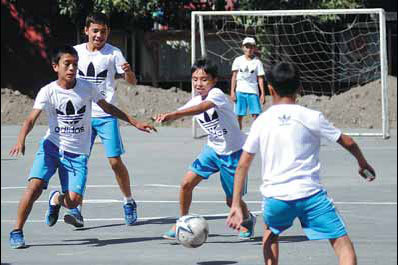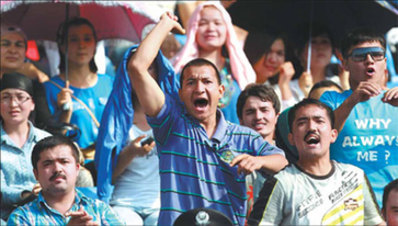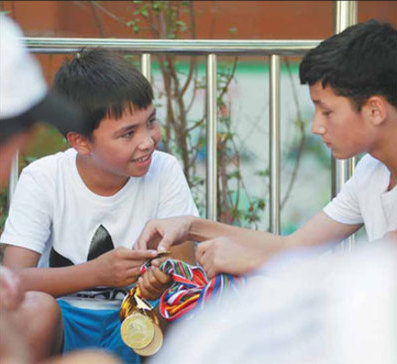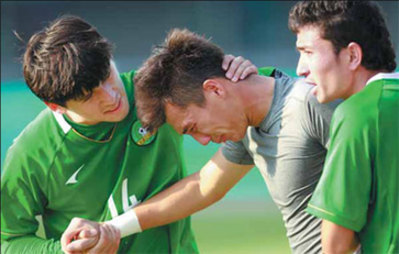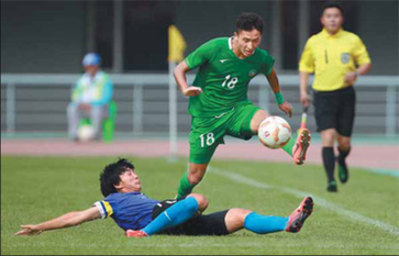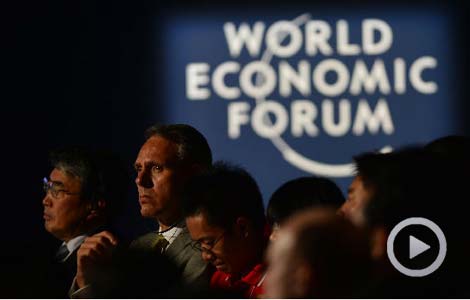Xinjiang scores on the national stage at last
Updated: 2013-09-17 08:18
By Sun Xiaochen in Shenyang and Cui Jia in Urumqi (China Daily)
|
||||||||
The region faces challenges in developing soccer, report Sun Xiaochen in Shenyang and Cui Jia in Urumqi.
When Erjet, the goalkeeper for the Xinjiang Uygur autonomous region's under-20 soccer team, buried his face in the grass and wept, the crowd in Shenyang Tiexi Stadium gave him an ovation fit for a hero.
Chants of "Xinjiang urra", or "Going forward, Xinjiang", in the Uygur language echoed around the 30,000-seat stadium as hundreds of Xinjiang fans shouted and clapped to cheer their players after the team lost its first-ever semifinal in the National Games in a penalty shootout.
The 6-5 defeat to hosts Liaoning was the region's best result in the competition, as it ended the tournament ranked fourth out of eight teams.
Despite the loss, Erjet, a member of the Kazak ethnic group, and his teammates left the stadium with their heads held high. Simply making it to the National Games was a victory for Xinjiang soccer, long out of the national spotlight.
"We feel so blessed to be part of the history of Xinjiang soccer," said the 20-year-old. "We are so proud to have motivated and inspired young players back home."
Although it enjoys huge popularity at the grassroots level, the lack of a local club in the top-tier professional league has seen Xinjiang soccer struggle to enter the mainstream of modern professionalism.
The lack of youth participation, which hampers the game's development in China's other inland provinces, has never been an issue in Xinjiang, where children are passionate about soccer and choose the game as their first and probably sole extracurricular sporting activity, according to Parhat, Xinjiang's head coach.
"Soccer enjoys unparalleled popularity in Xinjiang but in terms of its professional development, we still lag far behind," said the 39-year-old, who in 2005 steered the region to the National Games for the first time, when the team finished last in the 12-squad tournament.
Parhat believes the much-improved result this time round could motivate the governing body in Xinjiang to push for the foundation of professional local clubs to feed soccer fever at the grassroots level.
"Establishing a club is now the most urgent requirement for the future of soccer in Xinjiang because we need a platform to further develop our young talent."
Lacking access to the Chinese Super League, the country's top competition, most of the Xinjiang players retired after the four-year National Games campaign, although a few managed to earn contracts with clubs in other regions.
Erjet said he won't allow his soccer dream to die because he's aware of the responsibility on his shoulders.
"At least the next generation will have a target (playing at the professional level) to inspire them to keep working hard," said Erjet, who was signed by the second-tier inland club FC Henan Jianye after the National Games.
Road to professionalism
Although senior Uygur players such as Bali and Mirehmetjan won contracts with inland clubs to play in the CSL after the 2005 National Games, the region's talent is still going to waste.
The Under-18 team was knocked out in the preliminary rounds of the Liaoning finals, held in May. That left the players without any more games this season. Some of the promising youngsters in the team became physical education teachers, while others abandoned the game to look for work in other areas, even though few of them have received a full education.
In its defense, the regional governing body emphasized the difficulty of making radical changes quickly.
"The team's performance this time will definitely help us to push the professionalization of the sport, but some other difficulties remain," said Abulahet Amulism, director of the Administrative Center of Soccer of Xinjiang.
The lack of sponsorship has also emerged as a serious issue because no local entrepreneurs have shown an interest in providing financial support for the team.
Abulahet admitted that occasionally he envies the region's basketball officials. Xinjiang's professional basketball team, The Flying Tigers, has enjoyed consistent support from the energy and real estate giant, Xinjiang Guanghui Industry Investment Group.
"We are trying hard to attract investment from various businesses, but we haven't signed any long-term deals yet. Hopefully, the breakthrough at the games this time will spark some interest," he said.
According to web portal Sohu, the limited budget meant members of the Under-18 team had to endure a 49-hour train journey back to Xinjiang from southeast Guangdong province after finishing winter training in February.
Still, the players stressed that the opportunity to continue playing is more important than prize money or good facilities.
"As players who are truly passionate about the game, money and awards are the least important things. We can handle the tough environment so long as the game is there to play," said Mustapa, the captain of the Under-20 team.
Perhaps more seriously, security issues have also been cited by the local authorities as posing a further challenge to the development of professional clubs.
Li Xiaoxia, director of the Institute of Sociology at Xinjiang Academy of Social Sciences, said religious extremism is sometimes spread among the local people during weddings and funerals, and even at soccer games.
In the summer of 2011, two international friendly tournaments were called off by the Xinjiang local government, which cited security concerns after a number of attacks in Hotan, a city in southern Xinjiang, and in Kashgar.
"When they host mass gatherings, such as a sold-out soccer game, the organizers are under immense pressure to maintain security because of the high risk of terrorist attacks," said Abulahet.
Strong youth foundations
The challenges won't hamper the foundations of youth soccer. Uygur children demonstrate a passion for the game comparable to that seen in Brazil, said Liu Yi, deputy director of the Xinjiang Sports Bureau, who oversees the development of youth sports.
"Wherever you go in Xinjiang, you see children happily playing soccer on all types of surfaces, such as dirt patches and grassland. They even play in their bare feet. They just love it," he said.
To fuel the passion, Xinjiang decided in 2011 to promote youth soccer by organizing regionwide games, laying soccer pitches and providing coaches. The move seems to have paid off, because the number of primary and high school students playing the game in Xinjiang has risen to 100,000 from 10,000 in 2011.
As if to emphasize that upsurge in participation, the Under-13 team from Urumqi No. 5 Primary School claimed two championships in July.
The team scored 71 goals in six games and won the National School League in Beijing before winning the Weifang Cup, the 2013 International Youth Soccer Tournament held in Shandong province a week later, beating opponents from Japan and South Korea.
"The Japanese team challenged us to a rematch after we won the tournament, and we beat them again," said head coach Yalimemet Muhsut, who has been coaching students at the school for 20 years.
Azmet Arken, 11, the team's main striker, knows his position and role in the team to a tee. "Our team plays together like a family, I think it's something China's national team could learn from us. The players may have better individual skills, but they don't have the bond we have," he said.
Yalimemet dreams of providing players for the national team, but a lack of opportunity means many players have little choice but to quit the game while still young.
He admitted that he always feels sad when he thinks of a talented goalkeeper who is just 17, but has left soccer to work in his family's business. "He is tall and very flexible, but he just couldn't see any future," said Yalimemet, with a rueful shake of the head.
He stressed that the region desperately needs a top-drawer professional team.
One local team, Xinjiang Haitang FC, mostly comprised of players from the region's Under-20 squad, played in China's third-division last year, but hasn't registered for the league this year because the players either signed for higher-level league clubs or simply retired to look for work when the National Games ended.
In May 2012, the team's home game against Beijing Sangao attracted more than 46,000 fans, a record attendance for the league, and made other clubs slightly envious in the process, according to an online report on Sina.
"If we had a professional team, the kids could work their way up steadily. But if that doesn't happen, many of them will fall through the rungs on the ladder," commented Yalimemet.
In 2012, he spent 15 days with FC Bayern Munich in Germany, learning about youth training. "Children need to have the best coaches, and we don't have enough of them," he said.
The school has four teams, three for boys and one for girls. The children train for approximately three hours every day under the guidance of just four coaches, who, with the exception of Yalimemet, are all part-timers.
Yisakjon Abliz, assistant coach of this summer's double-title-winning team, is a graduate of the school. He drives a taxi at night because coaching doesn't pay enough to support his family. "I just want soccer to stay in my life. Seeing how happy the children are when they're playing is the greatest reward," said the 31-year-old.
He added that finding halal food suitable for the children is one of the biggest problems when the team plays outside Xinjiang. "We always carry a lot of naan bread because finding Halal restaurants is often very difficult."
He said the children can now watch top-flight games on television, and so their understanding of the game is much more advanced than when he played in the school team. "The children often come to me in the morning and show me the new moves they learned from games played the previous night. It's amazing how quickly they learn new things."
A girl in a boy's world
Few of their opponents guessed it, but the No. 5 primary school team featured a female player in several matches during the summer tournaments.
When she is kitted out in the team jersey, short-haired Akdan Ali, 11, could easily be mistaken for a boy. "There is no competition for her in the girls' league. She has trained with the boys and is now better than some of them," said Yalimemet, his voice swelling with pride.
To improve the conditions for training, the school covered its concrete training field with plastic cement during the summer break.
Akdan hopes the new field will reduce the number of injuries suffered in training. "I often ended up bleeding after sliding tackles on the concrete, but tackling the boys is a lot of fun."
Azmet Arken said striker Akdan is the queen of the team. "I enjoy playing alongside her. We are good partners."
After returning from his stint with Bayern Munich, Yalimemet realized the fundamental importance of education for the players. "Only intelligent people can play soccer well. Many players in the champion team are ranked first or second in their classes. They won't be allowed to train if they fail their exams."
"I will join the national team when I grow up, then China will win the World Cup," said Azmet seriously, clutching his gold medals tightly.
Contact the writers at sunxiaochen@chinadaily.com.cn and cuijia@chinadaily.com.cn
|
|
|
Xinjiang fans cheer their team at the Shenyang Tiexi Stadium after it lost its first-ever National Games semifinal. Cui Meng / China Daily |
|
Akdan Ali (center), 11, was the only female player in the No. 5 primary school team during the summer tournaments. Yao Tong / for China Daily |
|
Erjet (center) the goalkeeper of the Xinjiang Uygur autonomous region's Under-20 soccer team, wept after losing the semifinal game. Cui Meng / China Daily |
|
Xinjiang's Under-20 soccer team (in the green strip) in action against the Liaoning province team during the National Games in Shenyang. Cui Meng / China Daily |
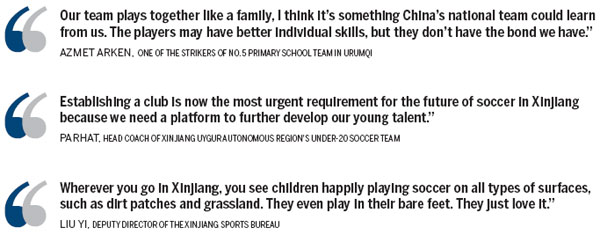
(China Daily USA 09/17/2013 page8)

 Shipwrecked Concordia declared vertical off Italy
Shipwrecked Concordia declared vertical off Italy
 Thirteen dead in US Navy Yard shooting
Thirteen dead in US Navy Yard shooting
 'Amazing Shanghai' on display in Big Apple
'Amazing Shanghai' on display in Big Apple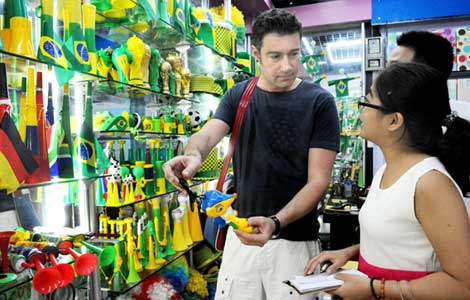
 Exporters to face more trade friction
Exporters to face more trade friction
 Watchdog bites with no favor
Watchdog bites with no favor
 Miss New York crowned 2014 Miss America
Miss New York crowned 2014 Miss America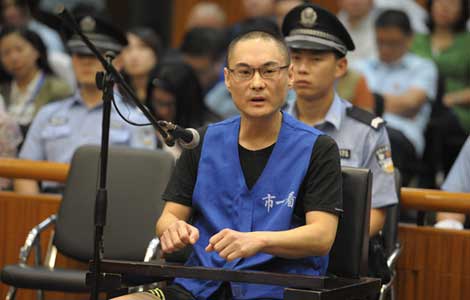
 Toddler-death defendant says he meant no harm
Toddler-death defendant says he meant no harm
 Summers withdraws from Fed chair contest
Summers withdraws from Fed chair contest
Most Viewed
Editor's Picks

|

|

|

|

|

|
Today's Top News
Trending news across China, Sept 17
BRICS pledge cooperation on climate change
CBRC set to regulate 'chaotic' WMPs
Exporters to face more trade friction
Thirteen dead in US Navy Yard shooting
China, US team up on Central Asia
UN confirms nerve gas used in Syria
Minimum growth rate set at 7 percent
US Weekly

|

|
